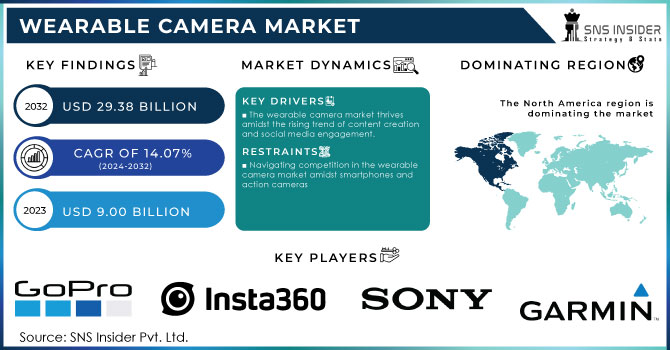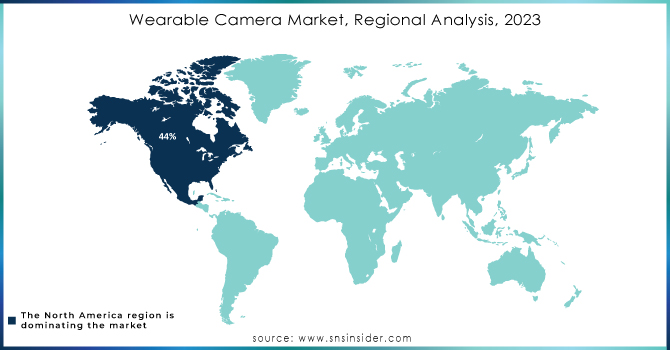Wearable Camera Market Report Scope & Overview:

Get More Information on Wearable Camera Market - Request Sample Report
The Wearable Camera Market Size was valued at USD 9.00 Billion in 2023 and is expected to reach USD 29.38 Billion by 2032 and grow at a CAGR of 14.07% over the forecast period 2024-2032.
The wearable camera market has experienced substantial growth in recent years, fueled by the rising need for capturing personal videos, documenting adventure sports, and enhancing security measures. The increase in social media and content-sharing platforms is a key factor driving growth in the wearable camera market. In 2024, social media usage in the U.S. is increasing, with about 82% of the population actively participating on different platforms. Out of these options, Facebook stands out as the most favored, capturing the attention of approximately 69% of users, with Instagram coming in at 43% and TikTok at 35%. Significantly, 60% of individuals between the ages of 18 and 29 acknowledge using TikTok, underscoring its popularity among younger age groups. Moreover, LinkedIn has a 22% user base, mainly consisting of professionals looking for networking chances. Regularly, about 75% of users access various platforms daily, spending an average of 2.5 hours on social media. Consumers are growing more interested in recording their daily experiences as they happen, and wearable cameras offer a creative solution for capturing high-definition footage and photos without the inconvenience of large, heavy gear. This pattern is especially common among millennials and Gen Z, who value genuineness in their online persona. The rise of live streaming has strengthened this market segment, allowing users to instantly share their experiences with followers, leading to more immersive and engaging content.
Wearable cameras are also widely used in the adventure sports industry. Sports enthusiasts and athletes are using these gadgets to document their adventures during activities such as skiing, surfing, and other extreme sports. For example, a skier can attach a GoPro HERO 10 to their helmet or chest as they ski down a steep slope. The camera captures impressive 4K video at fast frame rates, enabling the skier to record their exciting rides, film gorgeous mountain views, and post their experiences on social media platforms. Users can capture their experiences from distinct viewpoints by mounting cameras on helmets, goggles, or equipment. This not only improves individual experiences but also acts as advertising material for companies in the adventure sports sector, resulting in a positive outcome for both consumers and producers.
Wearable Camera Market Dynamics
Drivers
- The wearable camera market thrives amidst the rising trend of content creation and social media engagement.
The growth of wearable camera market has been greatly boosted by the surge in content creation as a popular activity. Due to the widespread use of social media platforms and video-sharing apps, people are more inclined to produce and distribute their own content. Wearable cameras offer a creative solution for content makers to record top-notch videos and photos without needing to use their hands. This pattern is especially common among younger age groups, who frequently utilize wearable cameras to record their everyday activities, trips, and interests. The convenience and transportability of these devices make them perfect for on-the-fly content creation. Moreover, the demand for wearable cameras has been boosted by the ability to quickly share content on social media platforms. Furthermore, brands are acknowledging the value of user-created content as an effective tool for marketing. Numerous companies are promoting the sharing of their products' experiences by consumers using wearable cameras, generating genuine content that connects with viewers. With the increasing emphasis on creating content, the market for wearable cameras is set to keep growing.
Restraints
- Navigating competition in the wearable camera market amidst smartphones and action cameras
Competition from smartphones and action cameras presents a challenge for the wearable camera market, as they provide comparable features. A large number of customers currently possess smartphones with top-notch cameras and advanced functions, causing them to hesitate when considering purchasing more gadgets. The capability of using only one device for multiple functions may discourage potential buyers from investing in separate wearable cameras. Moreover, wearable cameras face a big challenge from action cameras, which are tailored for recording active moments. These cameras frequently have tough exteriors and unique functions made for exciting activities. Therefore, consumers may choose action cameras or smartphones instead of wearable cameras for their particular requirements. To be successful in the market, producers of wearable cameras need to distinguish their products and emphasize special characteristics that separate them from smartphones and action cameras. Concentrating on specialized markets and areas where wearable cameras perform well can help reduce the effects of this competition.
Wearable Camera Market Segmentation Overview
By Type
The head mount segment held a market share of 68% in 2023 because of its versatility and user-friendly nature. Head-mounted cameras enable individuals to record videos and take photos without using their hands, which makes them perfect for a wide range of uses such as extreme sports, outdoor pursuits, and professional cinematography. Their capacity to offer a first-hand viewpoint boosts user interaction, particularly in fast-paced settings. For example, with the GoPro HERO series, users can attach cameras to helmets or hats, allowing them to capture their adventures without using their hands.
The body mount segment is to experience a rapid CAGR during 2023-2032 in the wearable camera market due to the rising popularity of wearable technology in sectors such as law enforcement, healthcare, and sports. Body-worn cameras, commonly placed on vests or clothing, allow users to record video and images without moving, offering a distinctive view that works well with head-mounted alternatives. This part has become popular in areas such as law enforcement, where body cameras are utilized to encourage accountability and transparency. Businesses such as Axon, once known as Taser International, are paving the way in creating body cameras specifically for law enforcement, guaranteeing top-notch video recording of events.
By Product
The cameras led the market in 2023 with a 75% market share, propelled by the growing need for top-notch, small, and light cameras appropriate for different uses. These cameras are extensively utilized in sports, adventure pursuits, and professional environments, allowing users to easily record footage without using their hands. Advances in technology, like HD recording, image stabilization, and connectivity options such as Wi-Fi and Bluetooth, have increased their attraction. For instance, GoPro is a top brand in this category, providing durable, water-resistant cameras designed for fans of extreme sports.
The accessories sector is experiencing the most rapid growth rate during 2024-2032 in the wearable camera market, driven by the increasing need for improved features and personalization of wearable cameras. Accessories like mounts, straps, cases, and extra batteries help users unlock their camera's full capabilities in different settings and activities. An example is Insta360, which offers various accessories such as the invisible selfie stick for users to film immersive 360-degree videos. Furthermore, Sena and other companies are creating specific mounts and cases for their wearable cameras, catering to the needs of motorsports and outdoor enthusiasts.
Wearable Camera Market Regional Analysis
North America dominated the market in 2023 with a 44% market share due to technological advancements and a strong consumer base that values innovation contribution. The area is known for its high disposable income, rising interest in smart devices, and growing use of wearable technology in industries like healthcare, sports, and entertainment. Major companies such as GoPro and Fitbit have released a range of wearable cameras targeting adventure seekers and fitness enthusiasts. An example would be the HERO series from GoPro, which is well-known for recording top-notch action videos.
Asia-Pacific is accounted to become the fastest-growing market for wearable cameras during 2024-2032, driven by rapid urbanization, increasing disposable incomes, and a growing population with a strong interest in technology. The need for wearable cameras is fueled by a range of uses, such as sports, tourism, and surveillance. Xiaomi and Sony are taking advantage of this trend by providing budget-friendly and cutting-edge wearable camera choices. Xiaomi's Mi Band series, incorporating camera features, demonstrates the growing incorporation of wearable technology in everyday routines.

Need any customization research on Wearable Camera Market - Enquiry Now
Key Players in Wearable Camera Market
The major key players in the market are:
-
GoPro (Hero10 Black, Hero9 Black)
-
Insta360 (Insta360 ONE X2, Insta360 GO 2)
-
Sony (Sony FDR-X3000, Sony HDR-AS50)
-
Garmin (Garmin VIRB Ultra 30, Garmin VIRB 360)
-
DJI (DJI Osmo Action, DJI Pocket 2)
-
Samsung (Samsung Gear 360, Samsung Galaxy Camera 2)
-
Ricoh (Ricoh Theta Z1, Ricoh Theta SC2)
-
Vuzix (Vuzix Blade, Vuzix M400)
-
Snap (Snap Spectacles 3, Snap Spectacles 2)
-
Kodak (Kodak PIXPRO SP360, Kodak Action Cam)
-
Wearable Cameras (Wearable Cam, Wearable Pro)
-
Shenzhen Witson Technology (Witson 4K, Witson 1080P)
-
YI Technology (YI 4K+, YI Lite)
-
Viewermore (Viewermore 1080P, Viewermore Mini)
-
Zeblaze (Zeblaze Thor 4, Zeblaze Vibe 3)
-
Sena Technologies (Sena Prism Tube, Sena 10C Pro)
-
Bury (Bury S900, Bury 8200)
-
AEE Technology (AEE S71, AEE MagiCam)
-
Pulsar (Pulsar Helion 2, Pulsar Trail 2)
-
Chobi Cam (Chobi Cam One, Chobi Cam Pro)
Recent Development
-
DJI Action 4, January 2024: The activity camera has been designed for the harshest conditions and now comes with increased lens clarity. The camera has more advanced stabilization and waterproofing technology, providing users with the ability to record nearly any outdoor activity and sport.
-
Garmin Varia RCT715, February 2024: The wearable camera doubles as a cyclist tail light and recordable device. The camera has two lenses, capturing both forward and rear visuals to note any incidents on the road from either perspective.
-
GoPro Hero 12 Black, September 2023: The camera has been designed for even the darkest lighting conditions and now has an improved battery and markings on the screen. Image stability has been improved; valued for the 5.3 K recording quality, the camera appeals to both action shooting and creativity.
-
Snap Spectacles 4, August 2023: The smart glasses are built with an advanced version of Snapchat, which allows the user to share images and videos captured with the glasses. The device now has improved lens capabilities and augmented reality features, allowing users to interact with their phones more realistically.
| Report Attributes | Details |
|---|---|
| Market Size in 2023 | USD 9.00 Billion |
| Market Size by 2032 | USD 29.38 Billion |
| CAGR | CAGR of 14.07% From 2024 to 2032 |
| Base Year | 2023 |
| Forecast Period | 2024-2032 |
| Historical Data | 2020-2022 |
| Report Scope & Coverage | Market Size, Segments Analysis, Competitive Landscape, Regional Analysis, DROC & SWOT Analysis, Forecast Outlook |
| Key Segments | • By Type (Head Mount, Body Mount, Ear Mount & Smart Glass) • By Product (Cameras, Accessories) • By End-User (Sports & Adventure, Security, Healthcare, Industrial, Others) |
| Regional Analysis/Coverage | North America (US, Canada, Mexico), Europe (Eastern Europe [Poland, Romania, Hungary, Turkey, Rest of Eastern Europe] Western Europe [Germany, France, UK, Italy, Spain, Netherlands, Switzerland, Austria, Rest of Western Europe]), Asia Pacific (China, India, Japan, South Korea, Vietnam, Singapore, Australia, Rest of Asia Pacific), Middle East & Africa (Middle East [UAE, Egypt, Saudi Arabia, Qatar, Rest of Middle East], Africa [Nigeria, South Africa, Rest of Africa], Latin America (Brazil, Argentina, Colombia, Rest of Latin America) |
| Company Profiles | GoPro, Insta360, Sony, Garmin, DJI, Samsung, Ricoh, Vuzix, Snap, Kodak, Wearable Cameras, Shenzhen Witson Technology, YI Technology, Viewermore, Zeblaze, Sena Technologies, Bury, AEE Technology, Pulsar, Chobi Cam |
| Key Drivers | • The wearable camera market thrives amidst the rising trend of content creation and social media engagement. |
| RESTRAINTS | • Navigating competition in the wearable camera market amidst smartphones and action cameras |

